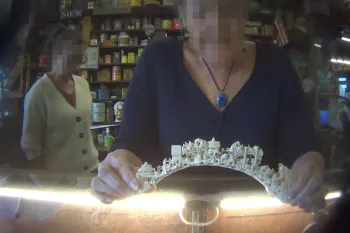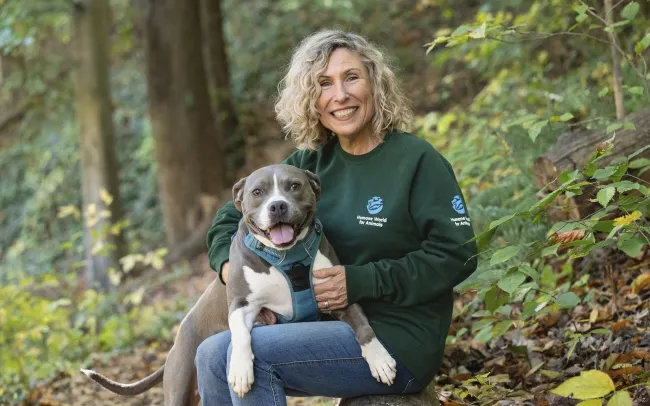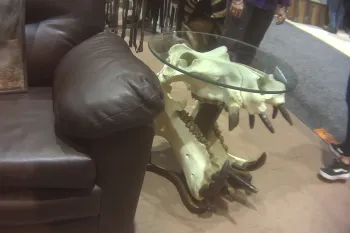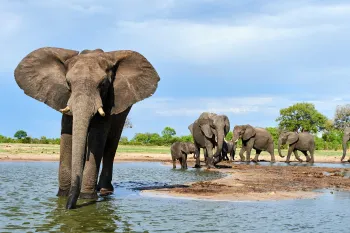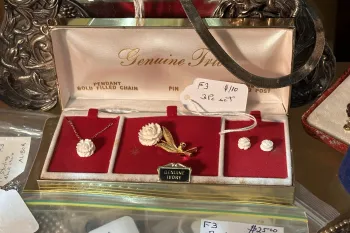There are some species whose strong family bonds and complex personalities challenge how we think about ourselves in relation to the animal world. Elephants are one such species. And yet, each year, between 10,000 to 15,000 African elephants are killed to feed a market demand for illicit ivory products. Poachers have even hacked off the tusks while the elephants are still alive. Young elephants—even babies—are not spared from the cruelty and violence of this illicit trade.
To prevent such widespread and acute animal suffering, we are releasing our new undercover investigation that reveals the widespread sale of ivory across Pennsylvania. Our investigators visited 31 stores across the state in March and searched more than 32 online auctions and marketplace sales occurring between January and April 2025. They found earrings, bracelets, necklaces and other pieces of jewelry; figurines; tusk and tooth carvings; cutlery sets; and an array of other household and personal items for sale in shops stretching from Swissdale to Allentown and points in between. The ivory items showed signs of originating from elephants, whales, walruses, hippos or warthogs. In some cases, the ivory was of undetermined origin.
Of the 63 locations investigated, 17 had ivory for sale that our investigators identified as originating from elephants. In total, 383 pieces of ivory were identified by our investigators in-person and online, more than we’ve seen in other recent investigations in Connecticut and Florida. The total value of items found during the investigation was nearly $38,000, with items ranging in price from $5 to $1,150.
Laws governing the sale of wildlife products are complicated. Under federal law, products of endangered and threatened species, such as elephant ivory and rhino horn, generally cannot be imported, exported or sold across state lines, with some limited exceptions.
Under current Pennsylvania state law, products of endangered and threatened species generally cannot be sold in the state without a permit. However, gaps remain that could be addressed by changes proposed in HB 994, a bill introduced by Representative Leanne Krueger, D-161, that would limit in-state sales of ivory and parts and products from other imperiled species.
Pennsylvania urgently needs to pass this bill in order to help protect elephants and other animals from poaching. If passed, HB 994 would limit in-state sales of parts from imperiled species, like giraffes and hippos, that are not currently protected under the federal Endangered Species Act or commonwealth law. Notably, we found items from both species for sale in Pennsylvania. In one of the stores visited, the investigator found a taxidermied head, neck and shoulders giraffe trophy for sale for $6,000.
And, as this investigation shows, many vendors in Pennsylvania sell elephant ivory in spite of existing state-level prohibitions. HB 994 would provide needed clarity by expressly prohibiting commerce in elephant ivory in the state.
When asked by our investigators, none of the sellers had or could provide any information or documentation to verify the age or origin of the ivory items. Without such documentation, it is impossible to know whether those items were imported in violation of federal law.
At some stores, some of the ivory was labeled as “bone,” which is often a misleading sales tactic we and others have witnessed in other investigations to obscure the trade in these items, perhaps in response to efforts to curb the trade in ivory or because consumers know that purchasing ivory is harmful to elephant populations.
The investigators also identified some ivory as originating from mammoth or mastodon. HB 994 would generally prohibit the in-state sale of mammoth and mastodon ivory, to limit the possibility that trade in ivory from these extinct species can provide sellers with cover to sell similar looking ivory from species such as elephants that still exist—for now.
The demand in the U.S. for the parts and products of at-risk species directly fuels the international wildlife trade. In Africa, the population of savanna elephants has declined by 60% since 1965 and forest elephants by more than 86% since 1984. Poaching elephants for their ivory continues to threaten these animals, their families, the ecosystem and communities that would have benefited from ecotourism. With fewer than 69,000 mature individuals remaining in the wild, giraffe populations have dropped nearly 40% over three generations and some giraffe species were recently proposed to be included for protection under the federal Endangered Species Act. Wild hippos are in a precarious position, too, with populations declining as much as 20% between 1996 and 2008. The U.S. imports more giraffe and hippo parts than any other country.
Thirteen states and Washington, D.C., have enacted laws in recent years to ban the in-state sale of ivory and other wildlife products—and this progress has withstood challenge in court: as intervenors, we helped ensure that New York’s ban was recently upheld by a federal appeals court and now know that the law will definitely stay in place after the Supreme Court of the United States declined to take up the case last week. Pennsylvania must follow suit.
If you are a resident of Pennsylvania, take a stand for elephants and other at-risk species by urging your legislators to support HB 994 to curb Pennsylvania’s participation in the trade of cruel wildlife products.
